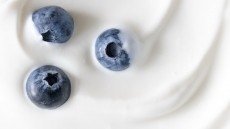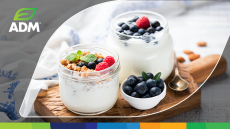Chitosan complex superior for emulsion flavour stabilisation?
citrus flavours and could offer a cost-effective alternative to gum
arabic, suggests joint Italian-US research.
Researchers from the University of Massachusetts and Universita di Bologna investigated the efficacy of a sodium dodecyl sulfate (SDS)-chitosan complex to stabilise citral and limonene, the major flavour components of citrus oils, in emulsion. "Both of these compounds can undergo chemical degradation leading to loss of flavour and the formation of undesirable off-flavours," wrote lead author Darinka Djordjevic in the Journal of Agricultural and Food Chemistry. " Engineering the interface of emulsion droplets with emulsifiers that inhibit chemical reactions could provide a novel technique to stabilise citral and limonene." Normally such stabilisation is done with gum arabic, said the authors, but the supply of gum arabic (E414 in the EU) is variable due to political and climatic factors in the primary producing countries like Sudan and Nigeria, and alternatives which replace the need for the gum or reduce the quantity used need to be investigated. The researchers prepared food emulsions using both gum arabic and the SDS-chitosan complex for each of the flavours and measured oxidation products to determine the degree of stabilisation. The researchers reported that, under acidic conditions (pH 3.0) the SDS-chitosan-stabilized emulsions retarded degradation of limonene and the formation of limonene oxidation products, limonene oxide and carvone, more than the gum arabic-stabilized emulsions. The SDS-chitosan-stabilized emulsions contained lower levels of the citral oxidation product, p-cymene, than gum arabic-stabilized emulsions, but gum arabic-stabilisation of emulsions retarded degradation of citral more than the SDS-chitosan complex. "The ability of an SDS-chitosan multilayer emulsifier system to inhibit the oxidative deterioration of citral and limonene could be due to the formation of a cationic and thick emulsion droplet interface that could repel pro-oxidative metals, thus decreasing pro-oxidant-lipid interactions," said the researchers. Research into chitosan as an encapsulation material from same group at the University of Massachusetts confirmed the bioavailability of encapsulated lipids from the chitosan microcapsule. Previous studies have reported that chitosan supplements can reduce cholesterol levels in both animals and humans, but such an effect was not observed when the chitosan was used as an encapsulator, said the researchers. Source: Journal of Agricultural and Food Chemistry 2 May 2007, Volume 55, Number 9, Pages 3585 -3591. doi: 10.1021/jf063472r "Chemical and Physical Stability of Citral and Limonene in Sodium Dodecyl Sulfate-Chitosan and Gum Arabic-Stabilized Oil-in-Water Emulsions" Authors: D. Djordjevic, L. Cercaci, J. Alamed, D.J. McClements, and E.A. Decker











